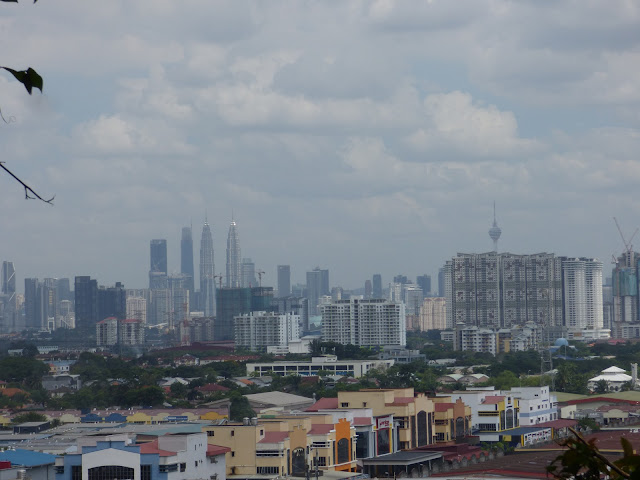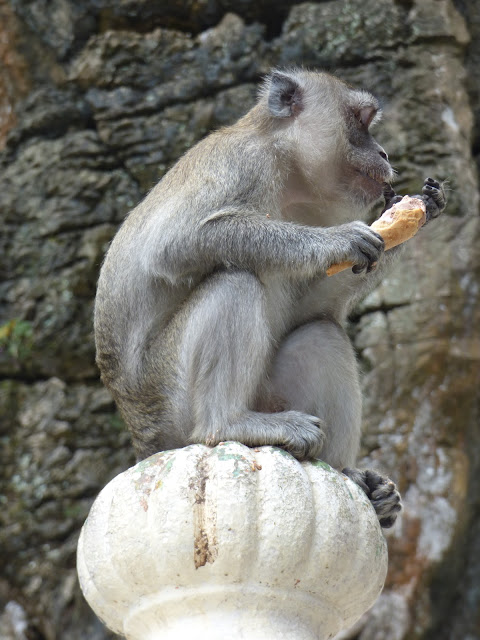Medicine from Malaysia... An Accupucture Annecdote
15 hours later we arrived, and oooooooh wow was I in a different part of the world. Thick forests of palm trees line the sides of the road, a haze of dirt hung in the air, and the humidity filled my lungs, each breath heavy and hot.
 Perhaps it was because I still had thoughts of biology exams not too far in the back of my mind, but for me one of the most fascinating differences between Malaysia and home was the attitudes towards science and medicine. Every single street had some shop selling a form of traditional Chinese medicine, and acupuncture is as common as visiting your GP. And despite my recently acquired biomedical degree, I knew next to nothing about any of it.
Perhaps it was because I still had thoughts of biology exams not too far in the back of my mind, but for me one of the most fascinating differences between Malaysia and home was the attitudes towards science and medicine. Every single street had some shop selling a form of traditional Chinese medicine, and acupuncture is as common as visiting your GP. And despite my recently acquired biomedical degree, I knew next to nothing about any of it.
Malaysia is a country built upon 3 populations: Malay,
Indian and Chinese. These three influences can be seen in every aspect of Malay
culture, from the food to the buildings, from the places of worship to the
medicine. And due to the vast and vibrant influence of Chinese culture in
particular, Chinese Traditional Medicine is practised throughout the country. Interestingly the influence of this traditional form of
medicine is not limited to certain social classes. Street vendors selling services for pennies can be seen down rougher streets, touristy areas
provide polished versions at inflated rates, and the wealthy will pay out the nose
for all family members to see a private specialist. The friends we stayed with
even paid for their pet dog to have acupuncture! As it became clear to me that for many Malaysians, traditional medicine often takes precedent over Western, I was going so have to learn more.
What is acupuncture?
Acupuncture is a process whereby fine needles are
inserted into the body. Typically needles will be inserted at standard
'acupuncture points', however this is at the discretion of the practitioner who
may decide they are needed elsewhere. Traditionally it was associated with a
spiritual component, aiming to balance a persons internal energy or 'chi'.
However a lot of people have begun to reject this element of the practice,
instead harbouring a more western view of acupuncture in 'synchronising' or
'regulating' the sympathetic and parasympathetic nervous systems (the network
of neurons within your body that control both the instinctive 'fight or flight'
response and the less famous but often favoured 'rest and digest system').
Whilst the credibility of these views is debated, the process is believed to relieve an array of ailments from cancer to
anxiety and even the common cold. Above all else acupuncture is famed for
aiding in pain relief. A pretty bold claim for a medicine that is over 2000
years old! Which begs the question...
Does it work?
Interestingly this is more of a complicated question
than you may think...
With so many claimed success stories and such an
extensive history it is no wonder that acupuncture is such a controversial
topic, and this is only driven further by challenges faced by researchers. Historically research
surrounding Chinese medicine has been doused in 'bad science' making
it difficult for anyone to draw any strong conclusions. Throw in a whopping
language barrier and cultural bias and you
find yourself in a world of poorly designed studies and insufficient evidence.
The major struggles in researching this topic can be mostly summarised in two key points:
1. Publication bias: research has been stunted due to poor quality of
clinical trials coming from some of the countries most invested in this research;
China, Japan, Hong Kong, and Taiwan. Whether this is due to a lack of funding
and facilities, a cultural bias (and perhaps biased investment) or simply a
language barrier, it is difficult to say.
2. There is huge variation in methodology, making it difficult
to determine if all acupuncture practices are effective or if it is just certain
techniques. To illustrate this point, in the US appointments typically last 50 mins whereas in China they average at 6 mins.
However
in recent years studies have improved and some solid research is beginning to be
seen. For now it is still largely inconclusive but we are getting closer to answering the question at hand: does acupuncture
work?
Well
the answer is.. (drum roll please)…maybe! (I bet you saw that one coming!) Let
me elaborate:
-
Acupuncture is almost always less effective than pharmaceutical drugs, however
positive results are seen when used to treat pain and nausea although it
is likely that these effects are the result of a placebo response, and these results tend to wane after prolonged treatment.
 |
- There is no difference between eastern, more spiritual variants of acupuncture vs western ‘clinical’ practices – indicating that the spiritual aspect is unnecessary to see any response
-It will not cure cancer/HIV/common cold (no matter how much you want it to).
So
now you may be thinking, ‘hmm, I see acupuncture wont cure my cold but perhaps it
might help ease my aching back, what’s the worst that could happen?’
Well
that’s what I’m here to tell you.
Firstly I should begin by saying the risk of acupuncture directly to the person involved if administered by a trained professional is minimal. That being said there is a small risk of bacterial infection from any needle wound, and when an individual is receiving numerous needle incisions this risk is obviously increased.
Firstly I should begin by saying the risk of acupuncture directly to the person involved if administered by a trained professional is minimal. That being said there is a small risk of bacterial infection from any needle wound, and when an individual is receiving numerous needle incisions this risk is obviously increased.
The significant risks come in when there is a lack of thought or understanding going into the decision to have acupuncture. Many people, particularly in countries such as Malaysia, swear by traditional Chinese medicine as their primary source of healthcare. However this leads to two major issues. Firstly those who cannot afford to go to a licensed place may feel they need treatment so badly they will go to ‘cowboy’ practitioners. Unlicensed practices will often fail to use clean needle techniques, leading to the spread of blood-bourne diseases including HIV. Secondly a reliance on traditional medicines may result in some individuals avoiding or delaying seeking pharmaceutical or western treatment, which in some instances can have serious consequences. Furthermore, perpetuating a false image of the efficacy of acupuncture and other traditional medicines further drives the belief that these treatments are the most effective, thus increasing the pressure on individuals to seek traditional treatment and so continues this cycle. As with so many aspects of science, false information can do more damage than just getting a few people to try an otherwise harmless form of treatment. But it cannot be argued that by a licensed, trained practitioner, acupuncture can be a safe treatment with even fewer side effects than most drug treatments.
Malaysia was the first step on my grand adventures and already I have learned so much about a culture I previously knew only by name. Since leaving Kuala Lumpur I have had the chance to experience even more of South-East Asia, and I can’t wait to share more of my adventures with you! Next stop, Borneo!
Happy travelling!
Vicky







A fascinating read as always. I was thinking of seeing an acupuncturist to help with pain as a slightly more holistic approach and now I am questioning the benefits. I think I will still give it a go. Malaysia looks amazing and full of history. You have made me want to know more. Thank you.
ReplyDelete